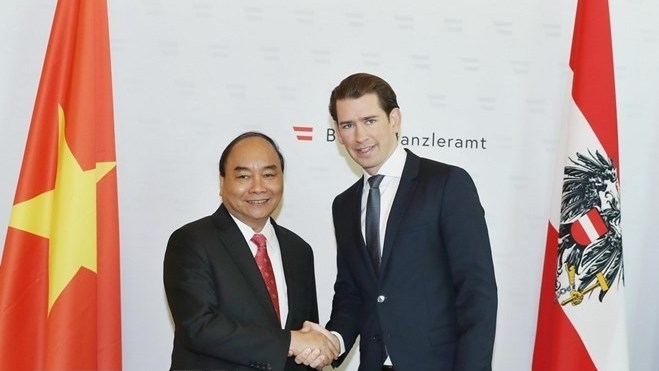



Vietnamese Prime Minister Nguyen Xuan Phuc (L) and Austrian Chancellor Sebastian Kurz (Source: VNA).
Both leaders expressed their delight at the fine development of bilateral relations since the two countries established diplomatic ties on December 1, 1972.
Chancellor Kurz stressed that the Vietnamese leader’s official visit marks an important milestone in bilateral relations, while appreciating Vietnam’s development and integration achievements, as well as its increasing role in the region and the world. He hoped for stronger and more comprehensive development in the bilateral relationship in the time to come.
The leaders exchanged views on measures to boost bilateral collaboration in all fields, ranging from politics, diplomacy, defence and security to economy, trade, investment, culture, and tourism.
They agreed to increase the exchange of all-level delegations and effectively carry out bilateral cooperative mechanisms, especially the inter-governmental committee.
The leaders noted with pleasure that Vietnam remained Austria’s largest trader in Southeast Asia while Austria maintained its position as one of the 10 export markets of Vietnam in the European Union (EU). They agreed to exert greater efforts to make Austria one of Vietnam’s leading economic partners in Europe.
Chancellor Kurz affirmed that with its role as the EU Chair in the second half of 2018 and as a close partner of Vietnam, Austria backs and will push for the early signing and ratification of the EU-Vietnam Free Trade Agreement (EVFTA).
He said that the agreement will open up major opportunities for economic, trade, and investment cooperation between Vietnam and the EU, as well as Vietnam and Austria.
The Chancellor also appreciated the Vietnamese community in Austria for their contributions to the host country’s socio-economic development and bilateral relations.
PM Phuc, in turn, thanked the Austrian Government for its support and preferential loans for projects in the fields of railway, healthcare, and vocational training.
He commended the effective operations of 30 Austrian businesses in Vietnam in the spheres of health, high technology, environment, and agriculture.
The two leaders agreed to work closely in implementing projects using Austria’s preferential loans, while also encouraging the two countries’ enterprises to enhance investment and business connectivity and cooperation in necessary fields for Vietnam’s development such as transport infrastructure, clean energy development, vocational training, science-technology, tourism, healthcare, and especially smart city building.
PM Phuc took this occasion to thank and propose the Austrian side continue creating favourable conditions for the Vietnamese community in Austria to well integrate into the local society and stabilise their lives.
In addition to bilateral collaboration, the two leaders also discussed international and regional issues of shared concern. They committed to promoting bilateral cooperation at international forums and organisations, such as the Asia-Europe Meeting (ASEM), the ASEAN-EU, and the United Nations.
They also exchanged views and affirmed the importance of maintaining peace, security, and stability for cooperation and development as well as settling differences and disputes in the East Sea by peaceful measures in line with international law, the UN Charter, and the 1982 United Nations Convention on the Law of the Sea (UNCLOS).
Following the talks, PM Phuc and Chancellor Kurz witnessed the signing of some cooperation documents. They included an funding agreement on a project on improving medical equipment for Cho Ray Hospital’s tumour centre, worth EUR 25 million between the Vietnamese Ministry of Finance and Austria’s Raiffeisen Bank; a memorandum of understanding (MoU) on scientific-technological cooperation between the Vietnamese Ministry of Science and Technology and the Austrian Ministry of Education, Science, and Research; and another MoU on e-commerce cooperation and Industry 4.0 between Vietnam’s Ministry of Industry and Trade and the Austrian Ministry for Digital and Economic Affairs.
Chancellor Sebastian Kurz then hosted a banquet in honour of Prime Minister Nguyen Xuan Phuc on his official visit to Austria.
Afterwards, the two leaders held a joint press conference, announcing the outcomes of their talks. The two sides issued a joint statement affirming the importance of boosting bilateral economic, trade, and investment cooperation.
The Austrian Chancellor highlighted the sound bilateral relations over the past five decades, saying that there remains potential for both sides to further boost their cooperative ties.
During the talks, they discussed issues related culture, politics and, economy, he said, adding that there are 30 Austrian businesses currently operating in Vietnam who are satisfied with the process of doing business in the Southeast Asian nation. The Austrian Chancellor expressed his hope for more Austrian firms to invest in Vietnam in the time to come.
PM Phuc said the two leaders agreed to create favourable conditions for enterprises of both nations to continue cooperation and investment, determined to make Austria a leading economic partner for Vietnam in the EU.
The two sides agreed on a range of specific measures to deepen the bilateral ties, he said, adding that Vietnam thanked the Austrian Government for its provision of soft loans in railway, healthcare, and vocational training.
The Vietnamese PM believed that with the positive outcomes of the talks and the long-lasting friendship and cooperation between the two countries, Vietnam-Austria relationship will continue to thrive.